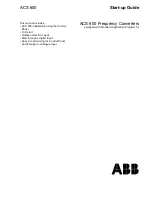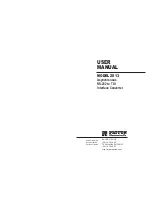
DATA Subsystem
[SOURce[1|2]:]DATA:VOLatile:CATalog?
Returns the contents of volatile waveform memory, including arbitrary waveforms and sequences.
Parameter
Typical Return
(none)
"INT:\BUILTIN\EXP_
RISE.ARB","USB:\XYZ\A.ARB","USB:\XYZ\B.ARB","USB:\xyz\xyz.seq"
Return the contents of volatile waveform memory assuming waveforms A.arb, B.arb, and C.arb were previously
loaded on channel 1 via a sequence file on USB:\xyz\xyz.seq:
DATA:VOL:CAT?
[SOURce[1|2]:]DATA:VOLatile:CLEar
Clears waveform memory for the specified channel and reloads the default waveform.
Parameter
Typical Return
(none)
(none)
Clear contents of waveform memory on channel 1 and reload default waveform:
DATA:VOL:CLE
[SOURce[1|2]:]DATA:VOLatile:FREE?
Returns number of points available (free) in volatile memory. Each arbitrary waveform loaded into volatile memory
consumes space allocated in 128-point blocks, so a waveform of 8 to 128 points consumes one such block, a waveform
of 129 to 256 points consumes two blocks, and so on.
The standard instrument includes memory for 1 million points per channel. You may also
Parameter
Typical Return
(none)
+382956
Return number of bytes of free volatile memory:
DATA:VOL:FREE?
Agilent 33500 Series Operating and Service Guide
193
















































